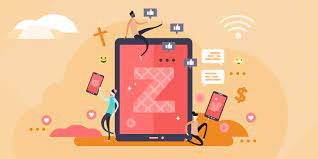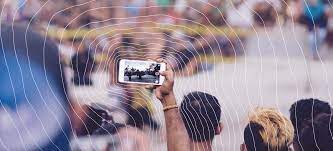Being a Gen Z I grew up with technology, I don’t know what life looks like without technology. I grew up having 24/7 access to the internet. Most of my generation, including me, depend on the usage of technology. According to an article on Jason Dorsey’s blog, Gen Z and tech dependency: How the youngest generation interacts differently with the digital world it states, “Gen Z are true digital natives. Our State of Gen Z research studies show that 95% own a smartphone, 83% own a laptop, 78% own an advanced gaming console, and 57% have a desktop computer. 29% use their smartphone past midnight on a nightly basis.” I am included in this static because I own a smartphone, laptop and even more technology including an iPad, air pods, and an apple watch. There are not many people my age that I know without a phone and laptop. Due to our usage of technology we have a digital footprint.
Personally, I know I have a digital footprint because I use digital media every single day. My usage of media has become a habit that is ingrained in me everyday. A form of digital media that I use in my everyday life is the internet. Among other things, I use the internet for my education, online shopping, and streaming media such as Netflix. There is not a day that goes by that I don’t pull up Google Chrome or Safari to help me complete a task. For example, today I have 11 tabs open in Google Chrome as I finish my finals which include High Point Blackboard, Media Law and Lit Blog, Google Docs, Google Drive, and Google Scholar. These are all digital media sources that help me with my academic career.
Almost all colleges, universities, high schools, and grade schools use technology to support their educational system, which constantly changes as technology advances. In today’s world most everything is done through online educational tools such as Blackboard Learn or Instructure Canvas. Having online platforms has helped Universities in a positive way because, “A digital learning platform allows access to a complete library of online resources…The learning material can be in the form of courses, multimedia content, archives and evaluations. All students can access the information anytime and from anywhere with the help of the Internet and a reading device of their choice, be it a laptop, tablet or a smartphone. Then there is also the option to download material and access for offline use” (The Role of Digital Learning Platforms in the Academic Growth of Students).
One positive aspect that technology had in the classroom was during the year of COVID19 when school went online. When classes suddenly had to go online the usage of technology helped students continue their education. At the time, almost every student was affected by this, and technology helped us adapt more quickly. In spite of the difficulty of getting used to doing school online, being able to do classes from the comfort of my own home was a big help when life was extremely hectic. Some online tools that were helpful were Zoom
and Microsoft Teams. These are online streaming sites that make it easy to have a setting similar to the classroom in the best way possible.
A negative aspect of the use of technology in the classroom is that it can be a distraction. Technology can be positive because of educational websites but there are also several websites that are not educational such as games and shopping. I know every student has used technology in a non educational way during class, I know I have. This can hinder students from learning the information effectively.
One positive aspect that technology had in the classroom was during the year of COVID19 when school went online. When classes suddenly had to go online the usage of technology helped students continue their education. At the time, almost every student was affected by this, and technology helped us adapt more quickly. In spite of the difficulty of getting used to doing school online, being able to do classes from the comfort of my own home was a big help when life was extremely hectic. Some online tools that were helpful were Zoom
and Microsoft Teams. These are online streaming sites that make it easy to have a setting similar to the classroom in the best way possible.
A negative aspect of the use of technology in the classroom is that it can be a distraction. Technology can be positive because of educational websites but there are also several websites that are not educational such as games and shopping. I know every student has used technology in a non educational way during class, I know I have. This can hinder students from learning the information effectively.
Another form of media that I use everyday is social media. I use many different types of social media including Snapchat, Instagram, Tik Tok, Facebook. There are so many people around us that use social media because it can be used in many different ways. “An Analysis shows that there are 4.74 billion social media users around the world in October 2022, equating to 59.3 percent of the total global population” (Global Social Media Users).
The usage of these social media platforms has a positive affect on my life because it helps me communicate, share information, and create content. Social media, especially snapchat and instagram help me stay in touch with my high school friends that go to different colleges. Even though I do not talk to all of them everyday it is helpful to see their posts to know what is going on in their life.
The usage of these social media platforms has a positive affect on my life because it helps me communicate, share information, and create content. Social media, especially snapchat and instagram help me stay in touch with my high school friends that go to different colleges. Even though I do not talk to all of them everyday it is helpful to see their posts to know what is going on in their life.
Social Media also has a negative effect on my life because it is a distraction. I often catch myself checking social media when I should be studying. Also social media affects how we act in person because in social situations so many people are absorbed with what is on their phone they forget to focus on spending quality time with the people that are right in front of them.
In conclusion, technology has affected my life in positive and negative ways when it comes to my digital footprint, educational technology, and social media.




































